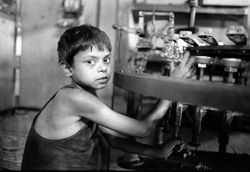Child labor is a horrible problem that plagues the entire world. Stolen Childhoods, directed by Len Morris and co-directed by Robin Romano, and narrated by Meryl Streep (Lemony Snicket's A Series of Unfortunate Events, The Manchurian Candidate). Morris and Romano trekked to seven countries across the world, bringing a sense of breadth to the issue, but the film feels a bit too much like an extended public service announcement. Because it visits so many people, it needs to move relatively quickly. It's hard to get an in-depth look at each issue; instead, one gets a quick glance at a multitude of issues. The production of the documentary is pretty bare bones, from various interviews on location and with talking heads, and with dry, almost robotic narration from Streep.
There's nothing necessarily wrong with this, it just makes the documentary feel more at home in a classroom or museum than in a theater. Stolen Childhoods asserts that there are 241 million child laborers (under 14) in the world today. The problem stretches from Brazil, Mexico, Nepal, Indonesia, Mexico, and even the United States. The movie is presented basically, going from one country to the next. In Kenya, children work on coffee farms, exposed to dangerous pesticides. Indian children scavenge garbage dumps for trash they can salvage, moving inches away from tractors. Indonesian children are kidnapped and forced to work on fishing stations. Young girls in Mexico City are forced to work in the sex industry. The last place that Morris visits is the United States, where migrant workers use their children to help them in the fields. Their help is necessary because the wages they earn are so low. As a result, many of these children are unable to move forward in school.
The footage that the filmmakers assemble is frightening. Young children toil away, making bricks from mud or lifting rocks in a stone quarry. Young children are chained to looms for misbehaving. According to some, child labor is the worst kind of sin; a moral one. Parents, especially poor ones from third world countries, have little choice but to send children to work in order to make money. In worse cases, they are kidnapped. Senator Tom Harkin likens it to slavery, and also advocates a living wage for agricultural workers. The good news is that across the world, there are many groups who are actively working to rescue children and publicize their plight.
So what can regular people do about this? Here is where Stolen Childhoods unintentionally feels like a public service announcement. It advocates buying carpets with the "Rugmark," symbol, one that assures buyers that no child was used in the production of the carpet, or products "Fair Trade" certified. Brazil had the novel idea of paying children to go to school. In a way, this is like an investment for the future. The most interesting speaker is Wangari Maathai, winner of the 2004 Nobel Peace Prize, who advocates debt relief. The film goes on to criticize the policies of the IMF for looking at economic policies only, ignoring social ones that could have disastrous ramifications. It's a reasonable request that makes a lot of sense. In the end, while many of the scenes are harrowing, there is no emotional connection to the children. Everything has a detached, weirdly sanitary feel to it. The best film for comparison is the documentary Born Into Brothels. This documentary looked at the children of Indian prostitutes, some of whom are destined to become prostitutes themselves. The emotional connection to the children in Born Into Brothels is much stronger, and as a result, the film feels intensely personal, and corresponding, much more emotional.
